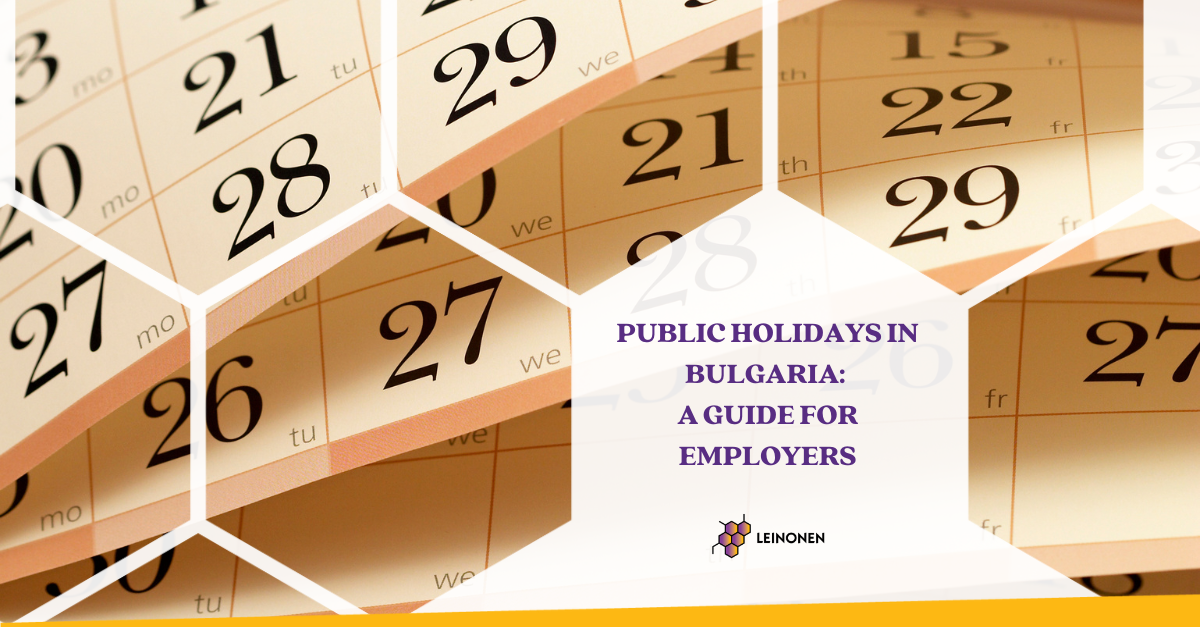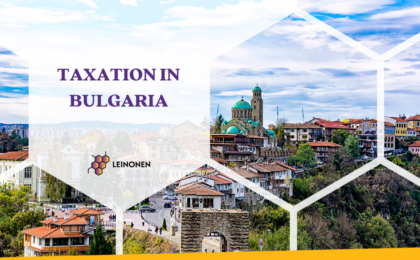Bulgaria is a country rich with cultural and religious heritage, and its citizens hold a great sense of national pride. Public holidays in Bulgaria are an opportunity to recognise and celebrate this history. During these important non-working days in Bulgaria, communities come together in celebration, remembrance, and solidarity.
As a business operating in Bulgaria, it is important to both understand the cultural significance of these dates, and know your legal obligations.
Which Dates are Public Holidays in Bulgaria?
The following public holidays are paid non-working days in Bulgaria:
- 1 January – New Year’s Day
- 3 March – National Holiday (Bulgaria’s Liberation from the Ottoman Empire)
- 1 May – Labour and International Worker’s Solidarity Day
- 6 May – St. George’s Day, and Day of Valour and of the Bulgarian Armed Forces
- 24 May – Bulgarian Education and Culture, and Slavic Script Day
- 6 September – Unification Day
- 22 September – Independence Day
- 24 December – Christmas Eve
- 25 and 26 December – Christmas Days
If a public holiday falls on a Saturday or Sunday, the following Monday is also a non-working day in Bulgaria.
Are any Public Holidays Celebrated on Different Dates Each Year?
Yes, the Easter holidays of Good Friday, Holy Saturday, Easter Sunday, and Easter Monday fall on a different date each year in accordance with the Orthodox calendar.
In 2026, they fall on the following dates:
- 10 April – Good Friday
- 11 April – Holy Saturday
- 12 April – Easter Sunday
- 13 April – Easter Monday
Are There any Free Days in Bulgaria for Specific Industries?
Yes, the Day of the Bulgarian Enlighteners is a special non-study and non-working day for educational institutions. This holiday falls on 1 November each year.
What are Employees Entitled to During Public Holidays in Bulgaria?
According to article 264 of the Bulgarian Labour Code, employees scheduled to work on a public holiday are entitled to at least double the wage they would normally get. This applies whether the work is overtime or not.
Entitlements of Non-Christian Employees on Religious Holidays
As a majority Eastern Orthodox Christian country, Christian religious holidays are free days in Bulgaria. However, as per article 173 of the Labour Code, employees who profess a religion other than Eastern Orthodox Christianity are entitled to paid or unpaid leave on the days of their own religious holidays.
Holiday Pay in Bulgaria
Employees who work more than four hours a day in Bulgaria are entitled to a minimum of 20 working days in paid annual leave. This entitlement starts after they accumulate at least four months of employment.
Calculating Holiday Pay in Bulgaria During Public Holidays
If a public holiday falls within an employee’s arranged annual leave, the public holiday should not be counted as part of their annual leave. For example, if an employee has four days of leave organised from 4 September until 7 September, Unification Day (6 September) should not be deducted from their accrued annual leave days. In this case, only three days should be deducted from their annual leave, but they should be paid for four (as public holidays are paid).
Manage Public Holidays in Bulgaria With Leinonen
Boasting a multilingual, highly skilled workforce, and one of the lowest corporate income tax rates in Europe, Bulgaria is fast becoming an attractive location for foreign-owned businesses. But while Bulgaria is an EU member state, it has held onto many unique regulations in everything from accounting to labour relations, as well as its own currency (the Bulgarian lev).
Leinonen has 17 years of experience supporting foreign-owned businesses in Bulgaria, and our vastly knowledgeable team of financial specialists are ready to take your business to the next level. Get in touch today to find out how we can help you navigate Bulgaria’s unique local laws and customs to maximise your success.





